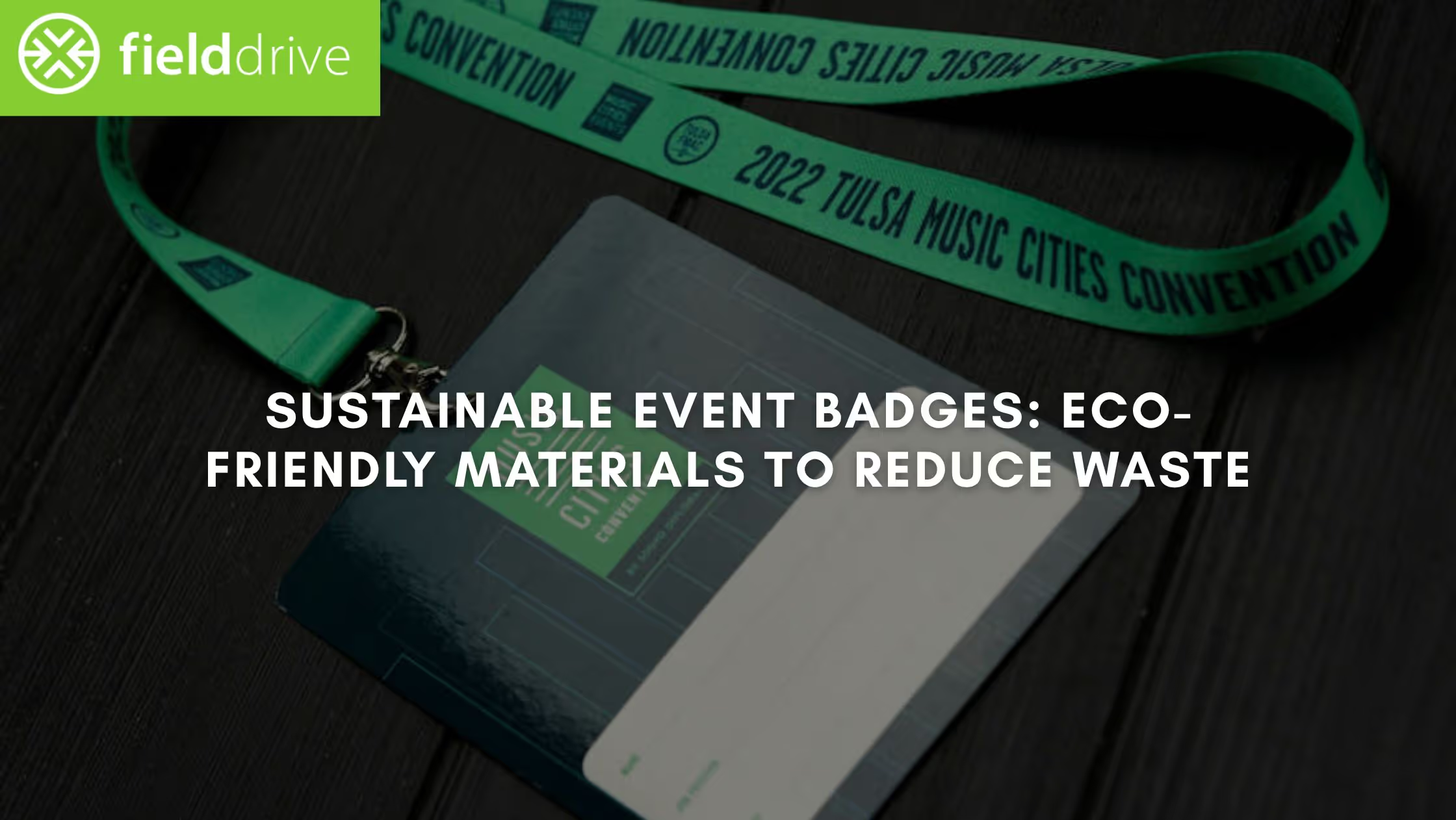Sustainable Event Badges: Eco-Friendly Materials to Reduce Waste
Regular event badges create a great deal of waste that impacts the environment negatively. Check out this blog post to learn what materials can help you make your badges more sustainable.

CONTENT
The event industry is facing mounting pressure to adopt sustainability. While 90% of executives acknowledge its importance, only 60% of organizations have formal sustainability strategies in place.
Event badges, though essential, are a major contributor to waste, making them a key area for improvement. By switching to sustainable event badges, organizers can significantly reduce their environmental impact while maintaining efficient operations.
In this blog, we’ll explore eco-friendly alternatives like natural materials and recycled options, offering practical solutions to minimize waste and enhance attendee engagement.
Key Takeaways:
- Sustainable Badging Materials: Using eco-friendly materials like recycled paper, plant-based plastics, and biodegradable badges helps reduce waste at events.
- Recycling and Reuse: Implementing badge recycling programs and repurposing badges as souvenirs or keepsakes reduces waste and adds value for attendees.
- Eco-Friendly Lanyards: Recycled fabric or natural fiber lanyards are simple ways to reduce event waste while maintaining functionality.
- Local Sourcing: Sourcing materials locally cuts down on carbon emissions from transportation and supports regional economies.
- Certification and Transparency: Material certifications like FSC and ISO 14001 ensure sustainable sourcing and manufacturing practices.
Natural Material Alternatives for Event Badges
Using natural, renewable materials for badges reduces reliance on plastic and supports sustainability.
Companies focused on sustainability report higher employee motivation, and according to McKinsey & Company, sustainability can reduce costs and increase operating profits by up to 60%.
Adopting eco-friendly badge materials aligns with both environmental and business goals.
- Wooden Badges: Made from sustainably managed forests, wooden badges are biodegradable and reusable.
- Plant-Based Materials: Materials like hemp and bamboo are renewable, compostable, and reduce reliance on nonrenewable resources.
Next, let's look into recycled and recyclable badge materials, which contribute to a circular economy and provide sustainable alternatives.
Recycled and Recyclable Badge Options: Benefits and Available Materials
Badges made from recycled or recyclable materials help move the event industry toward a circular economy.
Some key benefits include:
- Carbon Reduction: Utilizing recycled materials contributes to global efforts in reducing carbon emissions. 95% of G250 companies now publish carbon targets, reflecting the growing corporate emphasis on measurable sustainability.
- Cost Efficiency: Often cheaper than virgin materials, enabling budget-friendly sustainability.
Also Read: How to Host Sustainable Events in 2025
Even small event items like lanyards play a significant role in waste generation. Here's how choosing sustainable lanyards can make an impact.
Eco-Friendly Lanyards: A Simple, Impactful Addition
Even small items, such as lanyards, contribute to event waste. With the growing demand for sustainable products, particularly among younger consumers, choosing eco-friendly options is more important than ever.
73% of Gen-Z consumers are willing to spend more on sustainable products, highlighting the increasing consumer preference for environmentally conscious choices.
Sustainable lanyard options include:
- Recycled Fabric Lanyards: Made from rPET or organic cotton.
- Biodegradable or Natural Fiber Lanyards: Hemp or bamboo options reduce environmental impact.

Customization doesn’t have to come at the cost of sustainability. Let’s explore how event badge personalization aligns with green practices.
Customization Using Sustainable Practices
Sustainable customization aligns with growing corporate sustainability strategies, with many companies designating sustainability leaders to guide green initiatives.
Customizing badges can remain eco-conscious with the right approach.
- Soy-Based Inks: Reduce environmental impact compared to traditional inks.
- Laser Engraving: Clean, sustainable alternative to printed inks on wood or metal.
Also Read: Top On-Demand Badge Printing Tips for Pop-Up Events
For the most eco-conscious events, fully biodegradable and compostable badge options provide a responsible solution. Let's take a closer look.
Fully Biodegradable or Compostable Badge Options
Compostable badges are one of the most responsible and eco-friendly options for events. These badges offer the added benefit of being fully recyclable in their compostable form, helping close the loop of sustainability.
Additionally, selecting biodegradable or compostable materials helps reduce the use of single-use plastics, a significant environmental concern.
1. Plant-Based Compostable Plastics
Made from materials such as cornstarch, PLA (Polylactic Acid) plastic is biodegradable and breaks down in composting environments.
These plastics offer an alternative to petroleum-based plastics, significantly reducing the event's carbon footprint.
2. Biodegradable Paper
Paper badges made from fibers like hemp, bamboo, or post-consumer recycled paper decompose fully within weeks when exposed to natural conditions.
Unlike standard paper, which can contribute to waste accumulation, biodegradable paper ensures minimal environmental impact once discarded.
.avif)
Sourcing materials locally is an effective strategy to reduce emissions and support regional economies. Here’s why it matters for sustainability.
Local Sourcing and Manufacturing: Supporting Sustainability
Sourcing materials locally significantly reduces transportation-related carbon emissions and supports regional economies by promoting sustainable practices.
- Lower Carbon Emissions: By sourcing materials locally, events avoid the environmental impact of long-distance shipping, which significantly reduces transportation emissions and lowers the overall carbon footprint of the event.
- Economic Support: Local sourcing supports regional businesses and suppliers, contributing to the local economy while encouraging more sustainable practices in manufacturing and production.
Now, let’s explore how creative reuse can help your event be more sustainable.
Creative Reuse and Souvenir Value for Event Badges
Repurposing badges not only adds value for attendees but also helps reduce the overall environmental impact.
- Repurposed Badges: Transforming event badges into keepsakes, such as keychains or souvenirs, allows them to be reused long after the event, reducing waste and giving attendees a tangible memory.
- Badge Recycling Programs: Encouraging attendees to return badges for recycling or reuse offers a sustainable solution to badge disposal, promoting long-term recycling practices and reducing landfill waste.
Post-event recycling is crucial to closing the loop on sustainability. Here's how to implement easy collection and recycling programs.
Easy Collection and Recycling Programs: Encouraging Post-Event Responsibility
Implementing effective collection and recycling programs post-event ensures that materials such as badges and lanyards are properly disposed of or repurposed.
- Collection Stations: Strategically placed collection stations throughout the event encourage attendees to return badges, lanyards, and other recyclable materials, making the recycling process convenient and accessible.
- Incentives: Offering small rewards like future event discounts or branded items for recycling boosts participation, encouraging sustainable practices and helping increase overall recycling rates.
Also Read: Sustainability Beyond Badges: Zero-Waste Catering and Venues
Using certified sustainable materials can boost your event’s environmental credibility. Let’s discuss the certifications that matter most.
Material Certifications and Transparent Sustainability Claims
Ensuring that materials used in event badges are certified as sustainable provides credibility and reinforces environmental commitments.
1. FSC-Certified Paper: Using FSC-certified paper guarantees that the materials come from responsibly managed forests, ensuring minimal environmental impact and promoting sustainable forestry practices.
2. ISO 14001 Certification: Suppliers with ISO 14001 certification adhere to stringent environmental management standards, ensuring that the materials used meet international environmental criteria and help reduce overall impact.
3. GRI Reporting: 78% of companies now use the Global Reporting Initiative (GRI) standards for sustainability reporting. This ensures transparency in their sustainability practices, making it easier to track and verify the environmental impact of the materials used.
.avif)
Furthermore, when it comes to sustainable badges, custom solutions can be a perfect blend of functionality and eco-consciousness. Let's look at the benefits.
Bespoke Solutions for Unique Event Needs
Implementing sustainable badge practices is not only environmentally responsible but also aligns with corporate goals.
With 76% of consumers willing to abandon companies that neglect sustainability, and nearly half of global firms' earnings tied to SDG-aligned operations, adopting eco-friendly materials enhances both reputation and business performance.
Custom solutions enable organizers to strike a balance between functionality and sustainability, yielding practical and eco-conscious results.
- Custom-Made Sustainable Badges: Designed to fit event themes and audience sizes, these badges use eco-friendly materials while maintaining durability and design integrity.
- Collaborative Supplier Approach: Partnering with suppliers ensures badges meet both sustainability goals and event-specific requirements, reducing waste and the environmental impact.
Conclusion
With 45% of Fortune 500 companies planning to reach net-zero emissions by 2050, up from 39% last year and just 8% in 2020, sustainability is becoming a key business priority.
The event industry is aligning with these goals by adopting eco-friendly practices, such as using sustainable badges.
fielddrive supports these initiatives by offering sustainable badge solutions alongside its suite of event management tools, including real-time attendee tracking, secure session access, and advanced data analytics.
Book a demo today to explore how fielddrive’s solutions can help you streamline operations and meet sustainability targets efficiently.
FAQs:
Q: How do compostable badges benefit the environment?
A: Compostable badges break down naturally in composting environments, reducing waste accumulation in landfills. This option eliminates plastic pollution and minimizes the long-term environmental impact of event materials.
Q: Are there cost-effective sustainable badge options?
A: Yes, recycled paper and rPET plastic badges are often more affordable than virgin materials while offering significant environmental benefits. These options are cost-efficient without compromising sustainability or durability.
Q: What are the challenges in sourcing sustainable badges?
A: Sourcing sustainable badges may involve higher upfront costs, limited availability, and longer lead times. However, the long-term environmental and brand reputation benefits far outweigh these initial hurdles, especially as demand grows.
Q: Can event organizers customize sustainable badges without losing eco-friendliness?
A: Yes, customization can be achieved sustainably by using soy-based inks, laser engraving, and eco-friendly printing techniques, allowing organizers to create branded badges while minimizing environmental impact.
Q: How do badge recycling programs enhance sustainability at events?
A: Badge recycling programs help reduce waste by encouraging attendees to return badges for reuse or recycling. These programs ensure that badges are properly disposed of, promoting responsible consumption and supporting circular economy practices.
Want to learn how fielddrive can help you elevate your events?
Book a call with our experts today



.png)
.svg)
.svg)
.svg)

.svg)